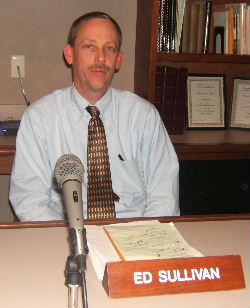 |
|
School expulsion hearings look like one-sided trials
By Sharon Bass
In Hamden, student expulsion hearings always lead to expulsions. At least over the last four years they have.
The Board of Education hires a lawyer to be the hearing officer -- it happens to be the same person every time -- who is paid 350 tax dollars a shot to hand down the same verdict every time. Staff time is taken up. And sometimes parents fork over a good chunk of change for a lawyer to attend the hearing in hopes their child won't be expelled.
"There is no due process whatsoever," said parent Al Lotto, who hired an attorney to represent his daughter last year when she was expelled from the middle school. "Every parent in Hamden should know that before they spend their hard-earned cash to retain an attorney and expect a fair hearing, that the Hamden BOE runs expulsions hearings as a kangaroo court, and the fate of your child's schooling is predetermined prior to the hearing.
"Every attorney in the state of Connecticut knows that the 'neutral' hearing officer is not neutral at all," he added.
Another Hamden parent of a child who was expelled and who didn't want to disclose his identity said, "It's a horrific experience. They've got discretion and they opt for expulsion. Yet they sit there and tell you how fair the process is. You can't argue that point with them because they refuse to discuss the situation."
His spouse added, "It seems to me zero tolerance -- which was a good intention -- is failing. It's not being used in a productive way."
Through a Freedom of Information Act request to school Superintendent Alida Begina, the HDN received the following information:
In school year 2001-02, there were 15 expulsion hearings and 15 expulsions. In 2002-03, there were 10 and 10; 2003-04, 22 and 22; and 2004-05, 36 and 36.
"The ones that get to that level are serious enough that the Board is not willing to settle for a lesser compromise," said BOE Chair Michael D'Agostino.
Begina responded in an e-mail to why all hearings turn into expulsions.
"In the vast majority of cases, an expulsion does result from such a hearing. This fact reflects the careful consideration by the Administration before a recommendation for expulsion is made. Sometimes, the student's conduct initiates the mandatory expulsion provisions of state law. Otherwise, a recommendation for expulsion is based on assessment of the seriousness of the offense, the impact on other students and the educational process, and the behavioral history of the students," she wrote.
The superintendent was also asked why the number of kids getting expelled is rising. Begina wrote: "… this fluctuates from year to year and reflects the actual number of disciplinary actions committed by students that warrant consideration for expulsion."
Rubber Stamping?
According to state law, either the school board or an impartial hearing officer makes the final ruling at these hearings. Attorney Peggy Pschirrer is Hamden's "impartial officer." She has been handling the town's expulsion hearings for about 10 years. She does the same for other towns like West Haven, West Hartford and Milford.
Hearing officers solely rely on information presented to them by the school board. "They do not 'confer' with others in making their decisions," said Begina. As parent Lotto said, hiring a lawyer to represent your child is throwing away money.
However, the situation is nearly the same in West Haven (messages left at East Haven's, Woodbridge's and North Haven's school departments were not returned). Assistant Superintendent Neil Cavallaro said of the 20 hearings so far this year all students were expelled.
"Usually when the school recommends the expulsion we go forward and so yes, we're batting a thousand," he said. "But we try to work with the families to get the kids back in school sooner."
Unlike in Hamden, Cavallaro said he uses two hearing officers: Pschirrer and attorney Michael Macniak, son of Ed Macniak, a Hamden school system retiree.
"We got some complaints about using the same person. We don't want to give anyone the impression that we're not doing the right thing. So we rotate" officers, he said.
The Crimes
Student infractions that led to expulsions in Hamden last school year included a bomb threat; assault on teacher; "serious threat" to another student; alcohol possession, distribution and consumption; marijuana possession; physical contact with a teacher; physical contact with a student; student fight (teacher injured); having a "dangerous weapon" off school grounds; and possession of a knife.
According to another parent who asked for anonymity, during the 2004-05 school year, a fishing knife was found in one of his friend's child's backpack. He said the boy and his dad had been fishing the weekend before and the boy said he forgot the knife was still in there. The explanation apparently didn't matter. The student was expelled.
Bring Back the BOE
It wasn't always this way. The Hamden BOE used to conduct the expulsion hearings. It is unclear whether it too systematically expelled every student. But having seven people instead of one be jury and judge would be fairer and more democratic. There have been rumblings recently about reviving the old method.
D'Agostino said the BOE has talked about it, is considering it but also said it's not a practical idea.
"We did it years ago and I think it ended up being unwieldy, given the time involved and the preparation involved," said the chair, who is also a lawyer. "It's like a mini-trial. It's usually more efficient using the hearing officer option."
Security system to cost much more than expected
By Sharon Bass
$100,000 was budgeted for high-tech security cameras at the new middle school.
At last night's School Building Committee meeting, however, it was made clear they would cost a lot more. And the contingency fund for the school project -- where the extra money would come from -- is pretty anorexic and is expected to shrink further to pay for remediating the unforeseen stump dumps on the site.
Reportedly, Hamden police and fire recommended the school be outfitted with 100 cameras. The current middle school has six; the high school has seven. The reason given for the huge jump is the way the new school is designed. According to Konover Construction's "loose" estimates, 100 cameras ring in at $290,000; 75 at $236,438; and 50 at $177,698. Those figures don't include the design and wiring of the cameras or door sensors and other security measures deemed necessary for seventh- and eighth-graders.
SBC member Michael D'Agostino questioned whether spending an amount that far exceeds budget would "displace other items. I'd love a camera in every classroom. All I'm worried about is if we use up the contingency fund on cameras and three weeks from now we need desks …"
"I think we're providing too many cameras," said member Austin Cesare. "I don't want to cut desks or chairs or school supplies." He advocated for 50 cameras instead of the 75 the Board of Education recently voted for. The SBC makes the final decision.
"We're talking about cameras that are being monitored by no one," said member Bob Westervelt. "We're not really preventing anything."
D'Agostino said the cameras serve more as an investigative tool for incidents that already occurred rather than as a deterrent.
But member John Keegan said he felt comfortable with buying 75 because the police and fire recommended that number. "The camera debate is a tricky one," he said.
The cameras would be placed inside and outside the building and fed into monitors in principal Frank Pepe's office. They would not be monitored, as Westervelt pointed out.
"There's not going to be anyone sitting in front of these screens all the time," conceded Pepe. But he said the door sensors, which are to be installed in all exterior and some interior doors, would send off a signal if forced open when locked.
"There are a lot of doors," the principal said, noting there will be two to the basement "where we don't want any kids going."
Pepe was told that the door sensors and the cameras are separate matters.
Twice during the meeting Pepe mentioned the usefulness of cameras in a Columbine-like situation. Though they wouldn't prevent people with guns from entering the school and begin shooting, the cameras could locate where the shooters are to help police capture them more quickly.
D'Agostino said he was also concerned with voting on an item when pertinent information is sketchy. "It's kind of a perverse way of doing business, voting on an item without knowing the design, without knowing the cost," he said.
Ross Mezzanotte, project manager for Konover, said a more accurate cost estimate would be given at next month's SBC meeting.
The committee voted unanimously for 75 cameras -- cost unknown.
After the vote parent Janet Coughlin said, "It's pretty simple. We have $100,000. How many cameras can we have?"
The SBC also discussed the stump dump dilemma at the Meadowbrook school site. Will Baker of Metcalf & Eddy outlined the options: capping ($?), removal to an outside disposal facility ($3.1 million) or reopening the town dump for the stumps ($1.2 million).
"We try to look for creative ways to lower the cost," he said.
There are three areas known to be contaminated. The first, where the athletic fields will go, is 9,000 cubic yards and has all been cleaned up, he said. The second is 3,000-5,000 cubic yards, of which Baker said 1,200 yards of material has been removed. The third is 5,000-10,000 cubic yards of which nothing has been removed. The reason the yardage varies is that it's still uncertain how much of the land is contaminated.
SBC Chair Curt Leng asked if there might be more contaminated soil closer to the school building. Testing wasn't done there because of the ongoing construction. He said he wanted to know before a decision was made.
"If we're going to remove all the material, we're back to capping it," said Baker, meaning it would be cost prohibitive to extend the cleanup via removal.
He also said "time is slipping." The plan has to go through the state Department of Environmental Protection for approval and a permit, which Baker said would take about two months.
Keegan asked if the state would reimburse Hamden for the stump job. Baker said he didn't know.
If the state won't pay, Leng said, "we'll take it up with our state delegation."
"What I'm hearing here is our ultimate enemy is time," said D'Agostino. "I also have some concern about looking for more problems (contaminated areas). We'll find them, we always do, but we need to move ahead."
Baker said doing two borings to test the soil near the school building, which would cost a max of five grand, would not affect the schedule.
January 25, 2006
Round 1

BOE Finance Committee Chair Ed Sullivan
The school budget talks have begun
By Sharon Bass
Chair Michael D'Agostino told the Board of Education last night to be real when it comes to next year's budget.
"Every single person knows we're not going to get 9 or 10 percent (increase)," he told a packed room of administrators, principals and a few residents at the Finance Committee's first meeting on the '06-'07 school budget.
Superintendent Alida Begina's recommended budget totals $89.5 million -- about $8 million or 9.9 percent higher than the current one. The state is projected to foot just under $20 million of the bill.
D'Agostino told the Board he spoke with Mayor Craig Henrici about the proposed budget hike and said there's no way the mayor would go along with it. "We'll be lucky if we get 5 or 6 percent -- lucky," he said.
So the chair suggested that before the next budget meeting Jan. 31, a more realistic one be drawn up. He said it should only increase last year's $81.3 million price tag with "what's absolutely necessary. I've been on the Board for six years now" and said he sees the budget get "chopped down" every time. D'Agostino said that creates antagonism between the mayor/Legislative Council and the BOE.
"I urge the Board to take this philosophical approach," he said.
Town employee and Hamden resident Don Werner clapped -- alone.
"I agree with Michael D'Agostino, let's present this budget realistically," parent Janet Coughlin whispered to the HDN. "It's a waste to send it to the mayor." The mother of three said she thinks the budget is too high, pointing to directors' and principals' "too high" salaries. (In Begina's budget, central office and directors' salaries ring in at about $2.5 million; principals' at $1.8 million. Both groups have contractual increases of 3.5 percent for the next fiscal year; teachers have a contractual 1.5 percent increase.)
The superintendent said the 9.9 percent spike is needed predominantly for additional staff. Hartford is expected to kick in 21.7 percent ($19.5 million) of the proposed budget -- far below the state's average educational cost sharing of 40.6 percent.
The school department compiled a 46-page document outlining the superintendent's proposal. Here are the new recommended positions:
4 elementary school teachers
1 high school gym teacher
1 Shepherd Glen resource person
8 middle school reading teachers
1 part-time Board clerk
1 high school nurse
2 pre-k nurses
2 reading aides
10 media/technology aides
6 special ed aides (state/federal mandates)
2 classroom aides (Spring Glen, Ridge Hill)
1 Bear Path custodian
4 new middle school custodians
"I'm kind of hesitant to see eight positions increased there (in the new middle school)," said BOE member Lynn Campo. "I don't want to get to the point where we're killing stuff we have now. I don't want to give up anything we have."
On another page of the super's document are requested new positions that have not been factored into the budget, and probably won't:
4.5 elementary "hot spots" teachers (Shepherd Glen, Alice Peck, art and music)
1 high school reading teacher
1 high school world language teacher
5 program specialists (science, literacy, math, speech)
1 technology/curriculum clerk
1 high school nurse
6 aides (new program)
1 Spring Glen classroom aide
5 special ed aides (state/federal mandates)
In addition to state and local tax dollars the school also gets grant money, which is not put toward the budget. Same as this year, Begina said she expects to receive $830,382 in competitive bids and $2.9 million in entitlement grants for the '06-'07 fiscal year. She said a small percentage of the entitlement money goes to Hamden's private and parochial schools.
Meg Nowacki, a new police commissioner who is a regular at BOE and Legislative Council meetings, questioned if all the new aides are needed. She also urged the Board to get bids from other bus companies. Hamden uses Laidlaw. Nowacki said other communities have done so with "favorable results."
She said she supports the Board's idea of contracting for groundskeepers instead of hiring them on staff, to save on providing benefits.
"I would caution you about looking for outsourcing," countered Werner. He said when the town did it some years ago "the experiment lasted less than a year. Less than six months, I think. I believe it ended up costing the town money because union positions had to be moved around." He said the contracted groundskeepers' work was poor.
Also, according to the 46-page document:
51 percent of elementary school students are classified as minority
49 percent of middle school students are classified as minority
42 percent of high school students are classified as minority
53.3 percent of all students are white
31.1 percent of all students are African-American
11.2 percent of all students are Hispanic/Latino
5.3 percent of all students are Asian
.11 percent of all students are American Indian
West Woods School has the lowest percentage of low-income students at 5 percent compared to Shepherd Glen, the highest, at 60 percent.
The next Finance Committee budget meeting is Jan. 31 at 6:30 p.m. On Feb. 14 at 7 p.m. there will be a public hearing and then the BOE will vote on the budget. Both meetings will be held in the boardroom at 60 Putnam Ave. After the vote, the budget is sent to the mayor and then to the Legislative Council. And most likely, it will be sent back to the BOE for some shaving.
-------------------------------------------------------------------
The middle school is asking for lots of security
By Sharon Bass
Hamden High has seven security cameras. Middle school principal Frank Pepe wants 75 for his new school (he's got six in the current school).
Pepe said he consulted with the Hamden police and fire departments on how many cameras are needed for the school on Meadowbrook, and that's what they came up with. "I have no reason to question them," he said at last night's Board of Education meeting.
It all comes down to architecture. "The buildings are completely different structurally," he said, and added that the high school needs more cameras.
"Who's going to monitor 75 cameras?" asked town employee and Hamden rez Don Werner. "It seems to me you'll need at least one full-time person."
Pepe said no. The cameras will not be monitored all the time. They are set off by motion. For instance, if someone broke through a window the camera would come on and film the person in the act.
"So it's more detection than prevention," said Werner.
"It's a little of both," said Pepe.
After the meeting, the principal was asked if there's an alarm component to the security camera system that would also be triggered if someone tried to break in. He said he didn't know.
The School Building Committee will take up the item this Thursday at 7 p.m. at 60 Putnam Ave.
What Will it Be?

The middle school's reincarnation has begun
By Sharon Bass
Whether it becomes a park, a retail center, an apartment complex, a community center -- or all or none or some of the above --Town Hall promises that the middle school that's about to be vacated will not sit and rot.
Not only that, it also promises to include the neighborhood in deciding what to turn the 180,000-square-foot building on 29 acres into.
Last week, Scott Jackson, the mayor's top aide, and Economic Development Director Dale Kroop met with consultants who'd like the job of reinventing the Newhall Street property. By next Thursday (Jan. 19), the seven contenders who showed at the meeting have to submit their ideas. Then a committee will be formed to interview the seven, and choose one.
Kroop said the group would most likely include folks from the neighborhood groups, an area business owner, a Parks & Rec employee and Councilpeople Willie Mewborn, 5th District, and Berita Rowe-Lewis, 3rd, who would be nonvoting members. Eventually an RFP will go out for a developer.
"I think the real goal at this phase of the project is to get the community to be thinking about what it wants," said Jackson. "We're not bringing in architects (right now). We're trying to get people to think about their community needs."
Soliciting neighborhood input will be one of the hired consultant's tasks. Others are doing market studies to determine if there's a need for the project(s) being considered, and to submit rough plans for the makeover, indicating about how much it would cost.
There's extra sensitivity surrounding this project, since it was discovered after the 1989 tornado that the school and the neighborhood are atop contaminated soil. The site used to be a dump for Winchester. Ever since the tornado, there has been heated debate about everything from the safety of living and going to school there to claims of racism in explaining why the remediation is taking so long. Last summer, the state Department of Environmental Protection said at a meeting in the Keefe Center that it would come up with a plan by the end of last year. It didn't.
Under a consent order, Olin Corporation -- which the former Winchester evolved into, as companies are often gobbled up by huge corporations -- is responsible for cleaning up around the houses. The Regional Water Authority is responsible for the school land.
Scott said the project timetable is unknown and somewhat hinges on whether Olin will be permitted to dump behind the middle school the contaminated soil it extracts from residences. The DEP is expected to rule on that.
Kroop said it would be a good five years before it was all done. However, he said he envisions more than one project on the land so something like a community park could be finished sooner. He also pointed out that the neighborhood is called Highwood, not Newhall.
"It's important to have an open mind," the economic development director said. "There are lots of competing ideas from different groups in the neighborhood."
He said he hopes for togetherness on the project. "We see the middle school as being a healing place," he said.
"We're excited about this," said Jackson. "Folks have been wondering what will happen."
He reassured: "We're not going to leave an abandoned husk of a building."
Coming up in the HDN: What the people of Highwood think.
January 11, 2006
Heinisch Gets Ass't Principal Job

Mark Heinisch poses right after last night's BOE meeting.
By Sharon Bass
Hamden High has a new assistant principal. Special ed teacher Mark Heinisch, 63, was voted in unanimously by the Board of Education last night.
Heinisch has been teaching in Hamden for the last three decades. Several schools he's worked in are no longer in existence. "I closed Sleeping Giant, Alice Peck, Putnam Avenue School," he said, joking that maybe he brings bad luck with him.
He's been teaching at Hamden High for the last seven years and since it's the only game in town, chances are he won't send that school to its demise.
This is Heinisch's first administrative post. Asked why he's trading in teaching for administrating, he said, "I like change."
They're right on the money, says D'Agostino
By Sharon Bass
From September 2004 to November 2005, the Hamden Board of Education spent $187,309 on lawyers, the HDN learned yesterday. However, that figure does not include the cost to fight lawsuits, such as those filed by parents who allege their child had been bullied, tormented or injured, said BOE Chair Michael D'Agostino.
"Anytime we get sued if a student gets injured or like the Lotto lawsuit, it's covered by liability insurance," he said. The Lotto family claims the school system meted out unfair punishment to their daughter, did not educate her as promised when she was expelled last year, yet gave her As, and was not protected from students who bullied and attacked her.
"Legal work is very expensive," said D'Agostino, a Hartford lawyer. "The fees sound right on the money to me, especially during a contract year," as last year was. He said the highest out-of-pocket expenses go to contract negotiations and labor arbitration, which will occur again in the 2007-2008 school year.
The BOE uses Shipman & Goodwin out of Hartford, and Berchem, Moses & Devlin in Milford. D'Agostino said the Board gets a particularly good deal from Tom Mooney of Shipman, who is the "preeminent education lawyer in the state. And we've been lucky enough to get him (at) below-market rates. He's been kind enough to do that for us and I'm not going to question it."
In response to a Freedom of Information request for an accounting of legal fees since September 2004, Finance Director Tom Pesce e-mailed the following information to the HDN yesterday.
"In response to your request dated 12/14/05 please be advised that legal services for the period from September 2004 to November 2005 were provided as follows:
Vendor:
Shipman & Goodwin
1 Constitution Plaza
Hartford, CT 06103
Amount: $120,781.31
Services including but not limited to: contract negotiations, labor issues, and personnel issues pertaining to certified staff; FOI issues; parent/student legal issues including special education, expulsion, and residency hearings.
Vendor:
Berchem, Moses & Devlin
75 Broad Street
Milford, CT 06460
Amount: $66,528.25
Services including but not limited to: contract negotiations, labor issues, and personnel issues pertaining to classified staff, parent/student legal issues including special education, expulsion, and residency hearings.
Due to confidentiality we are unable to release the remaining details of your request."
Ruled against twice, the BOE's busing case winds up in the top court
By Sharon Bass
A question before the state Supreme Court yesterday morning was, "Does the Hamden Board of Education have to bus preschoolers to the Highville Mustard Seed Charter School?"
It is a question that lower courts have already answered twice in the positive. The state and Highville contend Connecticut law requires Hamden to transport children under 5 to and from the charter school at 130 Leeder Hill Drive. The Hamden BOE disagrees.
The outcome of the Hamden Board of Education v. the State Board of Education probably won't be known for a month or more, according to lawyers involved in the case.
Assistant Attorney General Ralph Urban is representing the state board. He did not return messages yesterday seeking comment. Highville has hired New Haven lawyer Christopher Licari; and the BOE has retained its usual law firm, Shipman & Goodwin out of Hartford.
The Arguments
All sides acknowledged that state law mandates school districts to bus local charter students. But Licari and Urban maintained the charter school transportation funding law does not stipulate age. While Jennifer Janelle of Shipman & Goodwin said that law references other state laws, which only require busing children 5 and older.
"The statutes clearly don't obligate Hamden to provide transportation to preschoolers, even to the charter schools," she said. "The charter law references other school transportation statutes and both of those reference children in grades kindergarten and older. In a nutshell, if you look at all of the education statutes they all only apply to school-age children."
Licari offered a timeline of the situation.
Since 1998, Hamden had been busing preschoolers to Highville. Then, "in August of '03 Superintendent (Alida) Begina sent a letter to Lyndon Pitter (Highville's executive director, who's on administrative leave while the state investigates allegations of financial wrongdoings at the school) basically advising they were no longer going to provide transportation to Highville's pre-K students who were residing in Hamden, and didn't have an obligation to do so," Licari said. Begina cited budgetary and safety reasons in the letter.
"It is true that Hamden was busing the preschool kids but without the BOE's knowledge," said Janelle. "The parents were just putting their kids on the bus. And Hamden found out because the bus company complained that the buses were overcrowded. That's why Dr. Begina sent Highville a letter saying no more preschool kids on the bus. They consulted with counsel. They were advised that they were under no obligation to bus the kids."
So the school district stopped busing the preschoolers.
And their parents appealed to the Hamden BOE. On Oct. 3, 2003, the board upheld the superintendent's call.
"Then the parents once again exercised their statutory rights and appealed to the state Board of Education," said Licari, of Licari & Walsh. On March 17, 2004, the state Board of Ed overturned the Hamden BOE saying Hamden was obligated.
"The BOE did two things," said Licari. "It appealed the decision to Superior Court and asked the court to suspend their obligation until their appeal was decided." The BOE got the suspension on busing the children but was told it would have to resume transporting the pre-K kids the next school year.
"That created some interesting situations for the parents. One sibling is a preschool student and can't get on the bus while the older sibling gets on the bus. They're going to the same place but the younger one can't get on the bus," said Licari.
On Dec. 22, 2004, the Hamden BOE's appeal was heard in Superior Court in New Britain, which upheld the state decision, saying statute requires busing preschoolers.
So the BOE took its case to the Appellate Court in Hartford, but the "Supreme Court on its own decided to pull the case and decide it for itself," said Licari.
Safety First? Or Money First?
The Highville preschoolers are back on the bus for now as the highest court in the state makes a decision.
Janelle argued that safety is a big factor.
"They have 3-year-olds taking the bus with eighth-graders. There are no seatbelts, no child restraints, no hydraulic lifts. These are regular, full-sized buses," she said. "It's a commonsense argument You don't put 3-year-olds on a school bus."
And money is also right up there.
"It's been an uphill battle. Who wants to deny transportation to preschool kids? All the other preschool kids in Hamden don't get transportation," said Janelle. "It's incredibly costly."
Site designed by Joanne Kittredge

Tip Us Off
Send
news tips






